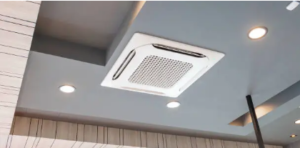 Air conditioning has become an indispensable component of modern lifestyle, providing many advantages such as improving mental health, stimulating the economy, and more.
Air conditioning has become an indispensable component of modern lifestyle, providing many advantages such as improving mental health, stimulating the economy, and more.
Preventing heat strokes – which kill thousands each year worldwide – also helps keep air cleaner and reduce allergens like pollen, dust mites, pet dander and mould spores in our atmosphere.
Improved Sleep
Many people struggle to sleep through the night, but air conditioning Adelaide can provide invaluable assistance in finding restful slumber. A cool sleeping environment promotes deep, restful rest that helps heal and recover from daily activities.
At nighttime, your body temperature drops, triggering the release of melatonin and other sleep hormones, helping you fall into deep, restful sleep more easily. Setting an AC system to the ideal sleeping temperature can assist this natural process of inducing restful slumber.
Recent research shows that cool airflow from an AC system stimulates sleep. Researchers used different airflow velocities and observed their effects on body temperature, skin temperature, rectal temperatures and waking behaviour.
Increased Productivity
Maintaining an ideal working environment for your staff allows them to remain focused and maximise productivity – ultimately turning into real revenue for your business and helping it remain competitive in an increasingly global economy.
Research in Brazil, India, Indonesia and Mexico indicates that income has more of an effect than climate on household adoption of air conditioning systems. Furthermore, those with higher education are more likely to install ACs.
Stimulates the Economy
Air conditioning provides economic stimulus by increasing income growth and decreasing government spending needs. Still, its energy use necessitates an increase in fossil fuel demand and creates a feedback loop between energy consumption and climate change, sparking environmentalist concern.
Prevents Sudden Infant Death Syndrome (SIDS)
SIDS refers to the sudden and unexplained death of infants under one year. While its cause remains elusive, many risk factors have been identified that may increase the chances of SIDS occurring. Air conditioning can play an integral part in helping prevent SIDS by keeping rooms cool and eliminating thermal stress to help safeguard infants against sudden infant death syndrome (SIDS).
Medical professionals suspect SIDS when an infant dies suddenly during sleep. Even after reviewing medical histories and autopsies of these cases, no explanation can be determined as to their cause of death.
Parents can reduce an infant’s risk of SIDS by placing them on their back using firm bedding and avoiding sleep positioning devices that have been found to increase SIDS risks, as well as using home monitors that have not been proven effective at preventing SIDS.
Helps Prevent Chronic Diseases
Air conditioning helps the immune system manage illness-spreading germs effectively. A hot environment forces your body to expend energy trying to regulate temperature, weakening its immunity system and leaving people more susceptible to infections.
Air conditioning has been shown to aid those who have asthma and other chronic illnesses by minimising the irritants that trigger these conditions. Furthermore, its cooling capabilities make air conditioning especially useful for older people and infants, who may be especially sensitive to temperature changes.
Air conditioning has been proven to improve patient recovery in hospital settings by improving vital signs, decreasing cardiac stress episodes and hastening recovery and physical activity – leading to decreased mortality from heat-related illness.
Prevents Pests
Many people attempt to rid their air conditioning vents of pests with insecticide spraying; however, this only kills surface-level insects; more will resurface soon enough and become even worse.
Improves Building Design
Before air conditioning was developed, skyscrapers relied on techniques such as high ceilings and open windows to circulate natural air throughout their structures. Indeed, some of the original buildings were even constructed specifically with ventilation in mind – they featured centrally available courts with alphabet-shaped light wells to encourage cross ventilation.
Industrial air conditioning Adelaide refers to controlling four fundamental variables relating to air temperature, humidity, movement and quality. It can also involve air cleaning services that remove dust, dirt and other pollutants from the atmosphere.
This study conducted an exhaustive comparison between several improvement designs of air conditioning configuration, their analysis using building performance simulation software and air distribution using comprehensive evaluation indices to compare results.
